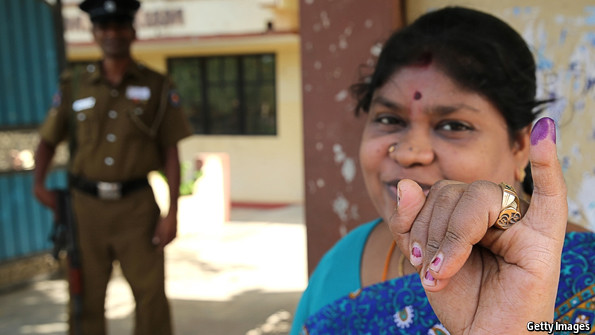 “NOW win the peace”, is common advice to victors of a civil war. Sri Lanka’s president, Mahinda Rajapaksa, ended a nearly three-decade long conflict in 2009, but his efforts to produce stability look badly skewed. He, along with Tamil leaders, are storing up troubles ahead.
“NOW win the peace”, is common advice to victors of a civil war. Sri Lanka’s president, Mahinda Rajapaksa, ended a nearly three-decade long conflict in 2009, but his efforts to produce stability look badly skewed. He, along with Tamil leaders, are storing up troubles ahead.Tour the north, where secessionist Tamil Tiger rebels once ruled, and signs of material progress abound. Since the war’s end splendid roads have spread, along with a web of pylons bringing electricity. A rebuilt train line will reach the country’s northern tip at Jaffna next year. Tens of thousands of foreign-financed houses are going up. The residents of one, former hut-dwellers, show off their flat-screen television, concrete walls and leafy garden. Northern towns, once isolated, buzz with motorbikes and three-wheel taxis.
Democracy had a fillip, too, of sorts, on September 21st, when the north held its first provincial elections. To dismay in Colombo, Sri Lanka’s capital, the Tamil National Alliance (TNA), a relatively hardline group, romped to victory, taking 30 of 38 seats. That was despite the efforts of sullen men from military intelligence near polling stations telling voters to back Mr Rajapaksa’s ruling party. Intimidation was widespread but ineffective. Foreign observers praised voters who defied a “compromised electoral environment”.
Still, celebrations were subdued: a few firecrackers and rueful smiles. Tamils know that their gain is largely symbolic, and they voted more in frustration than in hope. A first-time voter in Jaffna said it was not about development, but “having our own people rule”. Yet that prospect remains far off. Breaking earlier promises of devolution, Mr Rajapaksa’s central government will continue to run most affairs, notably public spending, the police and the distribution of land, much of which has gone to the army.
The provincial council is weak. Real power lies in a shadow military administration, including an army commander who is now governor. It will carry on deciding day-to-day matters. Meanwhile, the army forbids crowds from gathering in the north. Its spies spread fear—a policeman on polling day admitted that even he was scared of them. Many Tamils say just talking to a foreigner provokes interrogation. Plain-clothes figures sporting military haircuts frequently skulked near this correspondent, interrupting meetings.
None of this suggests that reconciliation between Tamils and the Sinhalese majority is going anywhere. A politician in Mullaitivu, a northern town, blames Gotabaya Rajapaksa, the defence secretary and the president’s brother, who oversaw the bloody end of the war. With his secret police, “he uses the military as a threatening programme, to create fear among people”, says the politician. He adds that military thugs often barge into his house. No wonder Navi Pillay, the United Nations human-rights commissioner, who toured Sri Lanka in August, warned of a drift towards authoritarianism.
If so, that is true in the south, too. But northern Tamil resentment runs especially deep. In part it flows from the horrors in the final weeks of the war, when the army killed thousands, perhaps tens of thousands, of trapped civilians being held as human shields by ruthless rebels. The army is also accused of killing surrendered fighters from the rebel Liberation Tigers of Tamil Eelam, or LTTE.
Northern anger may have eased a bit. But post-war treatment of the defeated has been crass. Bulldozing graveyards of rebel soldiers and denying Tamils memorials to the dead while erecting Sinhalese ones: this looks likely to hold back reconciliation, not encourage it. Triumphalist war-tourism sites are just as bad. But it is the military spies who instil greatest mistrust. “People are getting more hardline. Surveillance is very high, which upsets people,” says a human-rights activist.
It was discouraging, too, that the TNA election campaign suggested that Tamil attitudes are hardening in response. References to the LTTE’s late leader, Velupillai Prabhakaran, drew cheers and support from voters. He was a psychopath, more responsible than any other for Tamil deaths. Yet even moderate politicians found it convenient to call him a hero. As for the least moderate, one newly elected councillor, the wife of a disappeared Tamil rebel, claimed that her victory showed that “the LTTE is still living in the hearts of the people.”
Such talk is bound to provoke hardliners in Mr Rajapaksa’s government to seek more repression of the Tamils. It will also dismay foreigners who have understandable sympathy for the minority group. Already some Sinhalese commentators say the TNA electoral victory proves that Tamils should have been denied an election in the first place.
A university lecturer in Jaffna concludes that his community is traumatised and lacks leaders. Tamils, he says, “are morally disorganised”. As if to prove his point, one of Prabhakaran’s closest aides, Kumaran Pathmanathan, from his garden in Kilinochchi, argues that Tamils “know only the hardline, never the middle line”. That is obnoxious coming from the LTTE’s main arms procurer, an apologist for Prabhakaran for 35 years. But since his release from jail last year he has become a stooge of the defence secretary. The task for Tamils is to prove his claim wrong.